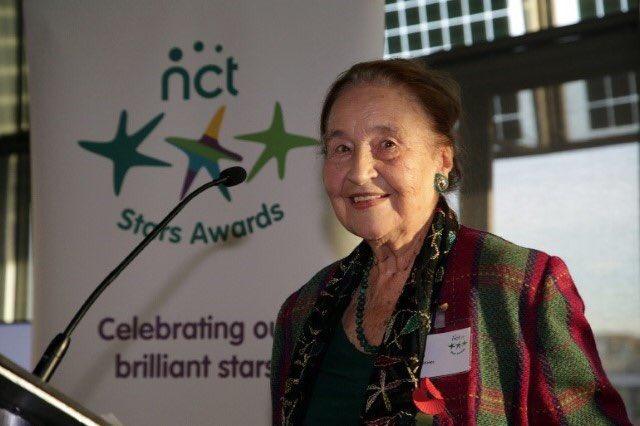Prunella Briance, founder of the National Childbirth Trust
After two traumatic childbirths of her own, she set out to spare other women such hardship. Many of her ‘radical’ ideas are now accepted best practice

Your support helps us to tell the story
From reproductive rights to climate change to Big Tech, The Independent is on the ground when the story is developing. Whether it's investigating the financials of Elon Musk's pro-Trump PAC or producing our latest documentary, 'The A Word', which shines a light on the American women fighting for reproductive rights, we know how important it is to parse out the facts from the messaging.
At such a critical moment in US history, we need reporters on the ground. Your donation allows us to keep sending journalists to speak to both sides of the story.
The Independent is trusted by Americans across the entire political spectrum. And unlike many other quality news outlets, we choose not to lock Americans out of our reporting and analysis with paywalls. We believe quality journalism should be available to everyone, paid for by those who can afford it.
Your support makes all the difference.The first time Prunella Briance gave birth she wasn’t afraid, but she prayed hard throughout. The Cypriot hospital where she was to deliver was experiencing a power cut, and early in labour it emerged that her placenta was worryingly low in the womb.
The doctor stayed all night in her room, consulting textbooks to determine how he should proceed. He opted for a caesarean with local anaesthetic, but had to halt halfway through to allow an electrician to rig up temporary lighting. When asked by the nurses whether she would die, the doctor answered, “I don’t know.” They didn’t realise Briance could understand them.
That was in 1953, and her baby boy was eventually delivered in good health.
Two years later Briance gave birth again, this time in London to a baby girl. Inspired by the writings of obstetrician Grantly Dick-Read, a proponent of what he called “natural childbirth”, she decided to take charge of how she would deliver. It all went well, she said, until the medical staff intervened, when the midwife accidentally dropped her and a doctor insisted she have castor oil. She was sick from the oil, and in agony due to the fall. In the end the baby “got stuck”, and died.
That tragedy, which Briance blamed on the hospital staff, nearly destroyed her. But it also convinced her to act. "Having mourned deeply, I suddenly came to life,” Briance said, “and realised that someone had to do something, and so I did."
Following Dick-Read’s research, she thought that expectant mothers could have unmedicated, often painless deliveries, if only they were made to feel confident and in control. She believed that a more natural approach would prevent other women from enduring what she did. In 1956 she announced the launch of the Natural Childbirth Association of Great Britain (NCA), “for the promotion and better understanding of the Dick-Read system”.
The NCA received reams of press coverage, and early encouragement in the form of a “good luck” telegram from the Queen. But the medical community was suspicious of the association, which seemed to be challenging hospital rules, and teaching midwifery without permission. Still, the association galvanised women to share their experiences of the labour ward, and to no longer leave every childbirth decision to medical staff.
Dick-Read was the association’s first president, and within two years the NCA started offering antenatal courses, teaching soothing patterns of breathing, among other techniques. The classes were as much social gatherings for middle class parents-to-be as they were an opportunity to learn about natural methods of pain relief. Soon, however, Dick-Read and Briance left the group, after bitter conflict with other members over the adoption of different methods of unmedicated childbirth.
In efforts to appease the medical community, which felt the phrase “natural childbirth” was an implicit attack on their expertise, the NCA changed its name to NCT, for National Childbirth Trust, and asked doctors for permission before having women attend its classes.
Despite these compromises the basic ideas of the group lived on, and in 1993 these were vindicated by the publication of Changing Birth, a government report recommending women be given more control over childbirth. Changes Briance had long fought for – such as fathers being allowed in to labour wards, women taking the lead in their delivery, and the end of indiscriminate anaesthetic use – are now taken for granted in British hospitals.
Criticism did not die down, however. In recent years both Briance and Dick-Read have been accused of promoting a dogmatic, traditionalist approach to childbirth. But Briance never changed her mind. In a letter to The Times in 2013, she wrote that “97 per cent of mothers, accurately instructed, attended and encouraged, can give birth without any interference or medication whatsoever”. The rest, she wrote, were “usually ill or damaged women” – a statement that once again divided public opinion.
Born Prunella Mary Chapman in 1926, Briance worked as a signaller in the women’s branch of the Royal Navy, before becoming one of the first British air hostesses on long-haul flights. She married John Briance, a diplomat, whom she met while they both studied Russian at university in London. She accompanied him on his postings to various foreign countries, including Iran and Cyprus.
After leaving the NCT, she performed publicly as a soprano soloist. She is survived by two children, seven grandchildren and two great-grandchildren. John predeceased her.
Though Briance’s relationship with the NCT was at times tempestuous, the trust treated her with reverence in her later years. With close to 100,000 expectant parents taking one of the charity’s courses last year, its influence is now greater than ever.
Prunella Mary Briance, natural childbirth campaigner: born 31 January 1926, died 14 July 2017
Join our commenting forum
Join thought-provoking conversations, follow other Independent readers and see their replies
Comments